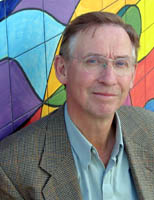 How can there be a correlation between free speech and the eradication of poverty? According to the Director-General of UNESCO, Koïchiro Matsuura, “free and independent media should be recognized as a key dimension of efforts to eradicate poverty”. It is the main theme of this year’s World Press Freedom Day.
How can there be a correlation between free speech and the eradication of poverty? According to the Director-General of UNESCO, Koïchiro Matsuura, “free and independent media should be recognized as a key dimension of efforts to eradicate poverty”. It is the main theme of this year’s World Press Freedom Day.Professor Tom Campbell, from Charles Sturt University’s Centre For Applied Philosophy & Public Ethics, explains how media freedom and access to information can play a key role in either disenfranchising or empowering the poor. “There’s a whole economic dimension to freedom of the press. If freedom of the press is about communicating widely and generally, then it does come up against the poverty of your intended audience in many ways. People don’t have access to the media because they can’t afford to purchase papers, or nobody is going to produce papers for them because there’s no profit in it, or people don’t want to advertise to groups who have no economic purchasing power.”
So does the wealth of a country lead to more freedom of speech, or can freedom of speech lead to more wealth? “There’s a strong argument to say that the two things go together, but it’s a chicken and egg question. Freedom of speech involves a cultural change which requires accepting tolerance and a preparedness to listen to the other side. If you don’t have extensive freedom of speech, then all sorts of good things can’t happen in a society, including development of education and democratic processes. Freedom of speech is not just a right to get it off your chest and articulate your views, it as a way of protecting your interests and promoting those of others. You couldn’t really conceive simply introducing freedom of the press on its own, but you can say it is a good place to start.”
Media freedom is an indicator of a country’s willingness to engage in the democratic process, which in turn fosters the intellectual, emotional and moral development of the individual. It makes society a better place. According to UNESCO, a free press is not a luxury that can wait for better times; rather, it is part of the very process which can bring about better times.
But freedom of speech can mean different things to different people. It’s a matter of degrees. Professor Campbell says it varies greatly from country to country.
“It has never meant you can publish absolutely anything you like with impunity. It has already been limited by defamation and laws of incitement to criminal acts. The major thing about freedom of the press is that it doesn’t prohibit censorship before publication, but it’s never meant that after you have published you are never subject to any legal sanctions, so it is a matter of degree, it depends on what the laws are.
“There is no such thing as complete legal freedom of the press.”





Social
Explore the world of social